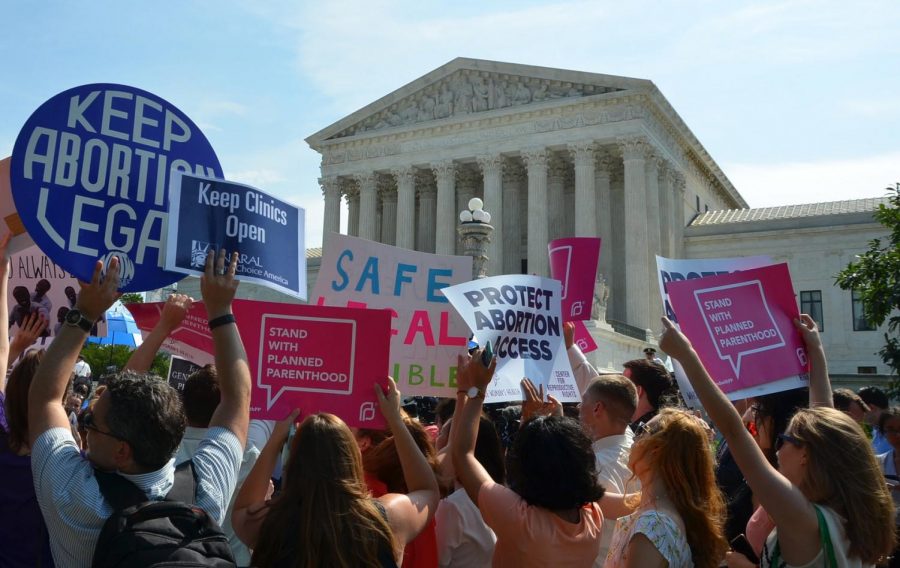The “Heartbeat” Bill passes in Texas
Pro-choice protestors outside the Supreme Court in Washington D.C.
September 24, 2021
The Supreme Court has refused to block one of the most restrictive abortion measures in United States history. The new law, the Texas Heartbeat Act, S.B. 8 (Senate Bill 8), has made abortion functionally illegal in the state of Texas, resulting in immense tension within an already polarized nation.
This controversial law bans most abortions after six weeks of pregnancy. While the law does make exceptions for medical emergencies, it does not include any exceptions for pregnancies resulting from rape or incest. Texas S.B. 8 leaves the term “medical emergencies” to doctor discretion, with the knowledge that a person is liable to sue if they disagree with the determined emergency. Doctors, within this scenario, are also required to check for fetal heartbeat, a term defined in the bill as “the steady and repetitive rhythmic contraction of the fetal heart within a gestational sac.” This period is determined to be around six weeks into a pregnancy, a time at which a person may not be aware of any pregnancy to begin with. The term fetal heartbeat, while defined by the bill, is not considered a clinical term, which only fortifies nationwide contention seen through varying protests in every state.
Much of the controversy generated is also, in part, due to the way in which the bill is enforced. The Texas Abortion Law deputizes United States citizens to sue anyone involved in performing abortions or aiding in the acquisition of an abortion. The law incentivizes vigilantes with a $10,000 reward for any successful lawsuit. The law itself essentially removes enforcement from state jurisdiction resulting in the capacity for anyone to file a complaint in any Texas state court if they believe an abortion has been performed. Those liable to suits are doctors, nurses, insurance companies, and even drivers who provided a service to a person seeking an abortion.
Coming from little precedent, this law immediately impacts women across the nation, not just in the state of Texas. Sitting President Joseph Biden commented upon S.B. 8 as “an unprecedented assault on constitutional rights.” The ban being after around 6 weeks into pregnancy contradicts Supreme Court precedent that prohibits states from banning abortions prior to fetal viability. This law has an innovation that was designed to avoid judicial review and allow for the Supreme Court to refuse any block to the bill that many other red states have attempted to pass. This feature that allows for the bill’s establishment is the fact that government officials who would originally be executing the law in practice are excluded from the enforcement process. Instead, the bill deputizes every citizen to hold anyone who aids and abets an abortion accountable. Because of this feature the Supreme Court voted in favor of the law with a 5-to-4 vote on Wednesday the 15th.
Despite the law being in Texas, the emotional impact that this law, and any discussion on abortion has, is global. While there is no explicit language in any religious text about abortion, many faiths have argued a strong position regarding the topic of abortion and the ethics involving life and death. Being a Catholic institution, there is an understanding that many Catholic students and faculty members oppose all forms of abortion procedures with direct purpose to inflict harm against a human fetus. Saint Anselm Students Renee Suhocki ‘22 and Rachel Statz ‘23, represent a part of the pro-life student body and bolster their anti-abortion perspective with their Catholic faith and understanding. The two were both excited to hear about the establishment of S.B. 8 and believe that this law is what the majority of the public wants and needs. Both students are pro-life supporters in the sense where they both believe in the need to support the woman and child.
“God says we are all made in his image and likeness of God. Life has a purpose and we should protect that.” Statz stated as she spoke upon her perspective of abortion as a whole.
Suhocki continuously reiterated as Statz spoke that “[we] do not believe any one of us has the right to take away life from the most vulnerable. We were all born with a purpose, God does not make any mistakes.”
Both Statz and Suhocki are active members at Saint Anselm College, and as the Texas Abortion Ban progresses in controversy the two discussed how their objective on campus and in society itself is to, “make abortion unthinkable, not illegal.” Statz and Suhocki aim to bring more attention on campus to issues regarding abortion and specified that they, “are here to support women who become pregnant and give them resources that are an alternative to a violent solution.”
Texas is just the foundation for other states in their advancement towards more complete abortion bans. Abortion is one of the most controversial issues in modern day politics and will only continue to advance the growing polarization seen in the contemporary political environment. The final objective of both sides, however, seems to be rooted in supporting women and women’s rights. How this objective is achieved is where the two parties diverge.



